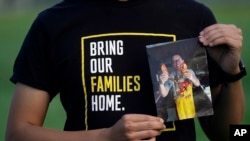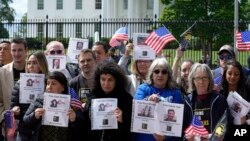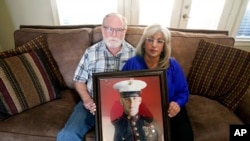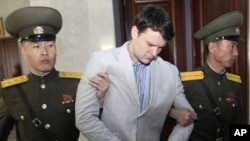The Biden administration has launched an intense drive to persuade Hamas and Israel to accept a new cease-fire proposal, announced by President Joe Biden last week, in the nearly 8-month-old war in Gaza.
The cease-fire plan begins with a six-week temporary pause in fighting in exchange for some of the 124 hostages still held by Hamas out of 250 taken during its Oct. 7 attack on Israel.
Mickey Bergman, who spent 17 years negotiating for the release of wrongfully detained civilians in some of the toughest spots in the world, spoke with VOA about the challenges in getting the deal done.
Bergman, CEO of Global Reach, formerly the Richardson Center for Global Engagement, worked alongside the late former diplomat Bill Richardson. They have been involved in unofficial negotiations in cases of detained Americans including basketball player Brittney Griner, journalist Danny Fenster, student Otto Warmbier, Marine veteran Trevor Reed, Navy veteran Taylor Dudley and others.
This interview has been edited for brevity and clarity.
VOA: How many cases does Global Reach (formerly Richardson Center for Global Engagement) work with these days, and how does your engagement begin?
Mickey Bergman, CEO Global Reach: We only take on a case if a family reaches out and asks us, because that's where our mandate comes from. Back in the good old days, we would do about six or seven of the cases at a given time. Then in the last five years, this skyrocketed. We have several cases that we're dealing with in Russia. We're dealing with case in Iraq. We're dealing in cases in Afghanistan, Pakistan. When Oct. 7 happened ... there were 67 families that we were directly working with. That number went down. Some of them [hostages] came home, some of them, unfortunately, died. I'm still spending hours and hours and hours with all these families, but the "theory of return" is one. In Gaza, there's an opportunity to bring at least 30 of them [Israeli hostages] back home. I believe that the terms have already been set, so every day that passes that it's not being implemented is a day in which they suffer, and some of them will not survive it.
VOA: How do opportunities get missed?
Bergman: Some countries or some entities that hold people hostages or political prisoners – when they set the goalposts, those don't move. And it just takes a really long and frustrating process to move everybody toward those posts. And so, once you get it, you can execute. Hamas is one – once they set the goalposts, fundamentally what they ask is what they'll get, otherwise they just won't be a deal. And the time it takes is extremely frustrating because we go to sleep every night in our bed. The hostages do not.
VOA: Over a decade ago, you were involved in the negotiations for the release of the Israeli soldier Gilad Shalit, kidnapped by Hamas in a cross-border attack in 2006. He was exchanged for over 1,000 Palestinian prisoners. Yahya Sinwar, Hamas' leader in Gaza and the mastermind behind the October 7 attack on Israel, was among those released.
Bergman: In 2008, we were able to convince then-Prime Minister Ehud Olmert to release the women and children and the Hamas parliamentarians to Fatah [formerly the Palestinian National Liberation Movement] outside of the deal. But then-Prime Minister Olmert still could not get himself to agree to 1,100 prisoners. It was [current Israeli Prime Minister Benjamin] Bibi Netanyahu that came to power who agreed to that.
I argue that the problem was not the deal itself. It needed to happen, because we needed Gilad Shalit home, and that was the responsibility of the state of Israel. It lost a certain battle, and there was a price for that. The problem was the aftermath of the deal. ...
VOA: Is there any correlation between hostage releases and captors being encouraged to opt for this tactic in the future?
Bergman: The biggest chunk of data was collected by Brian Jenkins from RAND Corporation. There's absolutely no correlation with the way that you solve cases to the number of cases that results from it. There are examples that when we don't negotiate, those countries actually take more Americans in order to increase the leverage. Look at Russia taking Paul Whelan. The U.S. government refused to negotiate. They've taken Trevor Reed. U.S. government refused to negotiate. They've taken Brittney Griner. Suddenly guess who's negotiating?
VOA: What is "fringe diplomacy" and why does it exist? [Bergman is known for coining the phrase "fringe diplomacy."]
Bergman: I define it as the area that goes beyond the mandate and authority of governments and international relations. It's the space where individuals, private sector, academia, artists, businesses can engage with each other and with other governments, except that we don't have the constraints the diplomats do. Most of the of the countries that we deal with are countries that the U.S. has problems with diplomatically. When an American is taken in Myanmar, how is the U.S. government planning on getting them back if they don't even talk to the captors?
When the U.S. government engages with a government like Russia or Venezuela or indirectly with Iran, as soon as the Americans and the Russians get into it ... the issue of Ukraine comes into play. ... They cannot separate [the] issue of their prisoners, so they cannot find what the solution would look like.
When we come in, we only have a mandate to do that. They can talk to us about policy, but we have no authority on policy, so we can listen – that's not going to impact anything – but we're able to completely focus on the issue of humanitarian and prisoners' issues, which allows us to refine and define what a pathway to resolving it is.
VOA: You engage with regimes in North Korea, Myanmar, Russia, Venezuela. What's the approach?
Bergman: Those things are never pretty. They're never good, because, essentially, you're exchanging an innocent person for a guilty person, so it doesn't feel just, but sometimes it's the only way to bring an innocent American back home.
We try not to challenge the local judicial process, because we're not lawyers and that's not going to help us. But there's a clarity at times, especially when the captor's asking for something in return: If you're asking for something in return for the person you're holding, whether they're guilty or innocent, you've just made them a political prisoner.
I don't go to these places and to these leaders and say, "Oh, you have the wrong person." That might feel good to accuse them, but it won't get me the person back. If I come back to the U.S. and I'm explaining how the North Koreans are viewing the world, it doesn't mean that I justify what they do, but it means that I am trying to explain what it is that they are seeing, for us to understand how they react to different things that we do.
You get to know them [regime officials] personally, and you find out that people are people. At the end of the day, nobody actually wakes up in the morning thinking: "I'm evil, let me see what I can do today." There's a certain reality or certain narrative that they see that justifies in their mind why they're taking those actions. You have to be able to see that in order to work with them, but sympathy can be a trap.
VOA: How did the war in Ukraine impact your engagement there?
Bergman: We [Governor Bill Richardson and Bergman] were in Moscow the day of the announcement of the "special operation," negotiating for [Marine veterans] Paul Whelan and Trevor Reed to come home. There's a famous saying, "never let a crisis go to waste." One example was when the pandemic hit, we realized that we had an opportunity, because for governments that held Americans as assets, suddenly those assets became a liability, because if they if they die in captivity, it's a whole different global ballgame between the U.S. and the country. So there was an opportunity to solve cases quickly. In Ukraine, it was clear where things are heading, and we felt that there's a sense of urgency before all hell breaks loose. The Russians were very reluctant to let us visit Moscow, we were conducting most of our conversations through Ambassador [Anatoly] Antonov and the embassy in D.C. As the situation in Ukraine was deteriorating, it opened the door for us to go in and open an informal dialog. We were hoping we would get both Trevor Reed and Paul Whelan back home, but [we] ended up getting Trevor Reed.
VOA: What was the most difficult case for you?
Bergman: One of the most devastating ones for me was Otto Warmbier and North Korea. I worked, I traveled there, and I really thought I'm going to be able to bring him home. And then when he eventually came home, only when he was airlifted, we found out that he was in a coma. For the whole 18 months of me negotiating, I didn't know that he was in that condition. And later on, I learned that my counterparts in North Korea also didn't know, up to the level of the vice minister of foreign affairs. I went to Ohio to meet them [Warmbier's parents] when he came back while he was still alive. I was in the room with him [Otto] and with Cindy [Otto Warmbier's mother] and all I could do is cry and tell her, "I'm sorry. I'm sorry. I'm sorry." And she gave me a hug, and she said, "Look, it's because of your efforts that I got to hug my boy when he was still warm." It was probably the lowest, professionally lowest one that I had. And the hardest case mentally.
VOA: Does the government see "fringe diplomats" as problem-solvers or as a nuisance?
Bergman: When you just start taking on the case, the captors don't want you involved because they have something they want from the U.S. government, not from you. And the U.S. government doesn't want you involved because you're going to muck up their strategy. But I don't represent any of them. I represent the family. We had a few incidents where we cooked up the deal, we got it all done. And they just grabbed it three days before to do it without telling us. But at the end of the day, they brought the people home. So, if our egos were hurt by it, we can live with that.
Bergman authored the recent book "In the Shadows: True Stories of High Stakes Negotiations to Free Americans Captured Abroad."











